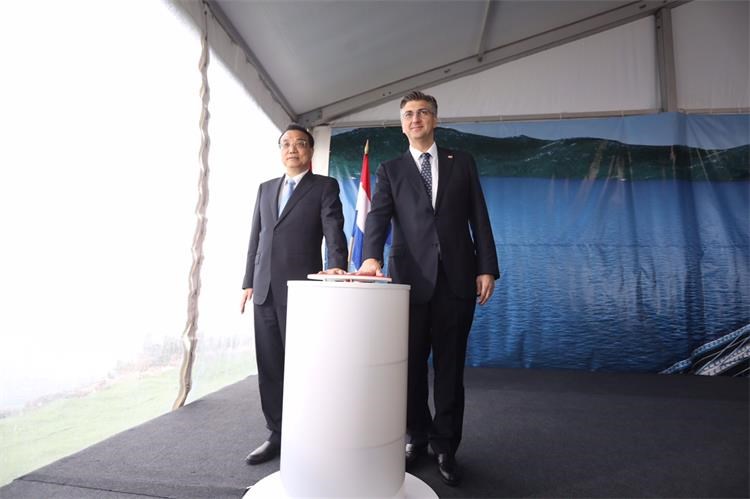


They symbolically lowered into the sea the last and biggest pylon from the first construction phase, the biggest of the 150 that will constitute the centre of the bridge, after which they unveiled a plaque to commemorate the completion of the first construction phase.
The bridge is being built by the China Road and Bridge Corporation (CRBC) and the EU is covering 85% of the costs. Together with access roads, the bridge is worth EUR 520 million. It will be 2.5 kilometres long and 55 metres tall and have four lanes.
"The rain outside is falling harder and harder," Li said commenting on the weather. "This sends a message to our company's builders that the bridge must withstand all weather conditions. We in China say that after the rain comes a rainbow, so the bridge, once it's built, will be a rainbow on Earth, and the Chinese builders can celebrate such a miracle with their Croatian friends."
Li arrived in Croatia after an EU-China summit in Brussels on Tuesday. He said the Peljesac Bridge project was important for his country's cooperation with the EU.
Plenkovic said the bridge was especially important for Croatia "because its realisation will represent a permanent monument, in the most visible sense, to the first few years of Croatia's European Union membership.
He said that construction-wise the bridge was one of the most important bridges built in Europe over the past decade. "It's worth noting that the total weight of the bridge is 80,000 tonnes of steel (which) means it will weigh as ten Eiffel Towers."
"This shows what kind of endeavour this is and what capabilities the CRBC has when it's planting these pylons which, at 130 metres, are practically among the longest in the history of bridge-building in the world," Plenkovic said, reiterating that this project gave China-Croatia cooperation an entirely new dimension.
After visiting the construction site, the two prime ministers and their delegations returned to Dubrovnik for possible bilateral meetings with some of the 15 prime ministers of central and east European countries participating in the 16+1 initiative, which will hold a summit in Dubrovnik on Friday.
Li arrived in Zagreb on Wednesday. The two countries signed six agreements on cooperation in infrastructure, agriculture, digital technologies, tourism, science and the economy. Four more will be signed in Dubrovnik today and tomorrow.
After the Peljesac bridge, the next big Croatian-Chinese project could be the modernisation of the Zagreb-Rijeka railroad and Croatian seaports, it was said at yesterday's meetings in Zagreb.
Li arrived in Zagreb with a 250-strong delegation. In Dubrovnik, he will be joined by hundreds more Chinese business people as the 16+1 summit is taking place at political and economic levels.
Text: Hina
More photos: https://www.flickr.com/photos/mvep_rh/